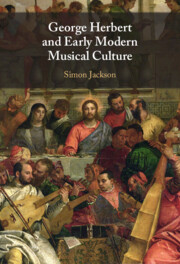Book contents
- George Herbert and Early Modern Musical Culture
- George Herbert and Early Modern Musical Culture
- Copyright page
- Dedication
- Contents
- Figures
- Musical Examples
- Preface
- Acknowledgements
- Introduction
- Chapter 1 Measuring Well
- Chapter 2 Communities of Voices
- Chapter 3 The Visual Music of the Masque
- Chapter 4 Concord and Consent
- Chapter 5 Double Motion
- Chapter 6 Singing the Psalms
- Epilogue
- Notes
- Bibliography
- Index
Chapter 6 - Singing the Psalms
Published online by Cambridge University Press: 11 November 2022
- George Herbert and Early Modern Musical Culture
- George Herbert and Early Modern Musical Culture
- Copyright page
- Dedication
- Contents
- Figures
- Musical Examples
- Preface
- Acknowledgements
- Introduction
- Chapter 1 Measuring Well
- Chapter 2 Communities of Voices
- Chapter 3 The Visual Music of the Masque
- Chapter 4 Concord and Consent
- Chapter 5 Double Motion
- Chapter 6 Singing the Psalms
- Epilogue
- Notes
- Bibliography
- Index
Summary
This chapter offers the Book of Psalms as the archetype for Herbert’s devotional song. Seventeenth-century psalm culture presents a model for Herbert’s interdisciplinary devotional poetic. In the psalms, and the widespread practice of psalm translation, the voices of poets and musicians engage with each other in collaborative devotional song. The psalms, too, offer a model for the kind of ‘visual music’ explored in Chapter 3, considered here in terms of the musically and spatially aware sequence of psalms known as the ‘Songs of Degrees’ (Psalms 120–34), a feature developed in Mary Sidney’s translation of Psalm 134. The singing of psalms also played an integral role in both public and private acts of devotion. Above all, this chapter sees in psalmody a spiritual enquiry which contests a merely human understanding of time and space to gain perspective on the nature of the divine. In the constructed first-person singular of the psalmist’s ‘I’, Herbert finds his words combining with those of other poets, musicians, and Christians.
Keywords
- Type
- Chapter
- Information
- George Herbert and Early Modern Musical Culture , pp. 175 - 203Publisher: Cambridge University PressPrint publication year: 2022

